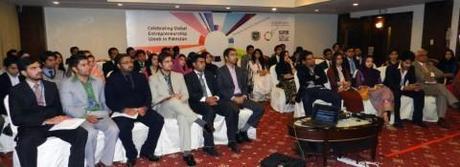
Attention Bloggers: Don’t forget about CIPE’s 2013 Blog Competition! The deadline for submission is December 2!
The Internet has reshaped the way the world does business, creating new opportunities for entrepreneurs and new modes for participating in the democratic process. As part of its celebration for Global Entrepreneurship Week, CIPE Pakistan recently held a blogging training session for University of Karachi students in the department of Mass Communication. The aim of the session was to give young bloggers the skills they need to become more effective citizen journalists, understanding complex issues and writing substantive content on political, economic, business and social issues in Pakistan.
CIPE was also seeking to encourage these students to take a more entrepreneurial approach toward building their own careers. As CIPE Pakistan Country Director Moin Fudda told the participants, Pakistan faces a range of challenges, including energy shortages, unstable security, and poor governance; but the biggest challenge might be the growing population coupled with high unemployment.
As Fudda pointed out, each year more young people enter the job market, but face a lack of professional opportunities. Against this backdrop, sessions such as these can help give students new ideas about how their hard work can open new career paths that could help them earn a living. Further, as Fudda pointed out, blogging on issues facing Pakistan will help ensure that young people are active and concerned citizens, who will eventually be ready to take leadership roles in the country.
Hammad Siddiqui, CIPE Pakistan Deputy Country Director, conducted the training session. He offered insight into how blogging and social media have changed the world’s perception of the news. He noted that people use social media to track instantly what “has happened, is happening and might happen,” and that social media has become a key tool to get, process, read and publish information. For instance, over 10 percent of CNN’s business comes from social media.
Siddiqui also challenged the students to think about why well-known people around the world are using social media to convey messages to large audiences and influence discussions. He cited the example of prominent Pakistani journalist Kamran Khan, on GEO TV, who is followed by nearly half a million people who want to hear his thoughts on events.
Siddiqui further noted the examples of the Virtual University of Pakistan, which has 11,000 videos on its portal that have been watched over 10 million times, or Coke Studio, a music program that saw growth from 35 million to 70 million users of its portal from September 2011 to the end of 2012. To provide a real-time experience, CIPE also invited the participants to tweet about the session with the hashtag #SocialmediaKHI. In just two hours, over 650 tweets reached an audience of 90,000 people.
Like social media, Siddiqui explained, blogging can give students a way to voice their views and publish ideas independently. CIPE assigned the participants to write stories on the topic of entrepreneurship, which will be shared during Global Entrepreneurship Week.
In the spirit of social media, we are also sharing the views of some of the students who participated in this productive session:
- Ramsha Sadiq: “I learned more about the increasing importance of social media, especially in the field of journalism. Got motivated to write blogs and focus them on one area of interest rather than writing on diverse things.”
- Nabeel Ismail: “The content was good as social media is the source from which you get most of the news about the world in seconds. I know much more about the social media and its power, I will be blogging and doing more tweets as I find it important for me.”
- Sheema Khan: “Spot on! At first I thought that it would be a boring workshop considering the number of hours, but the workshop managed to change my thinking about social media in the end. It revolved around the topic for sure. That social media can no more be taken for granted. It is more than what the world thinks it is. It is definitely not garbage nor designed for the time wastage. It is all up to the users to decide whether they want to use it in a healthy or unhealthy way. I don’t think the workshop lacked anything. Long presentations make me sleep usually, but this was the first presentation I managed to stay awake in. I had never used Twitter as much as I did during the session, it was fun. Wishing Hammad Siddiqui and his team all the best for the future. They’re doing a great job.”
- Sharjeel Ashraf: “The content was informative and constructive. Blogging a day keeps your writing from rusting away.”
Muhammad Talib Uz Zaman is Program Officer for CIPE Pakistan.

